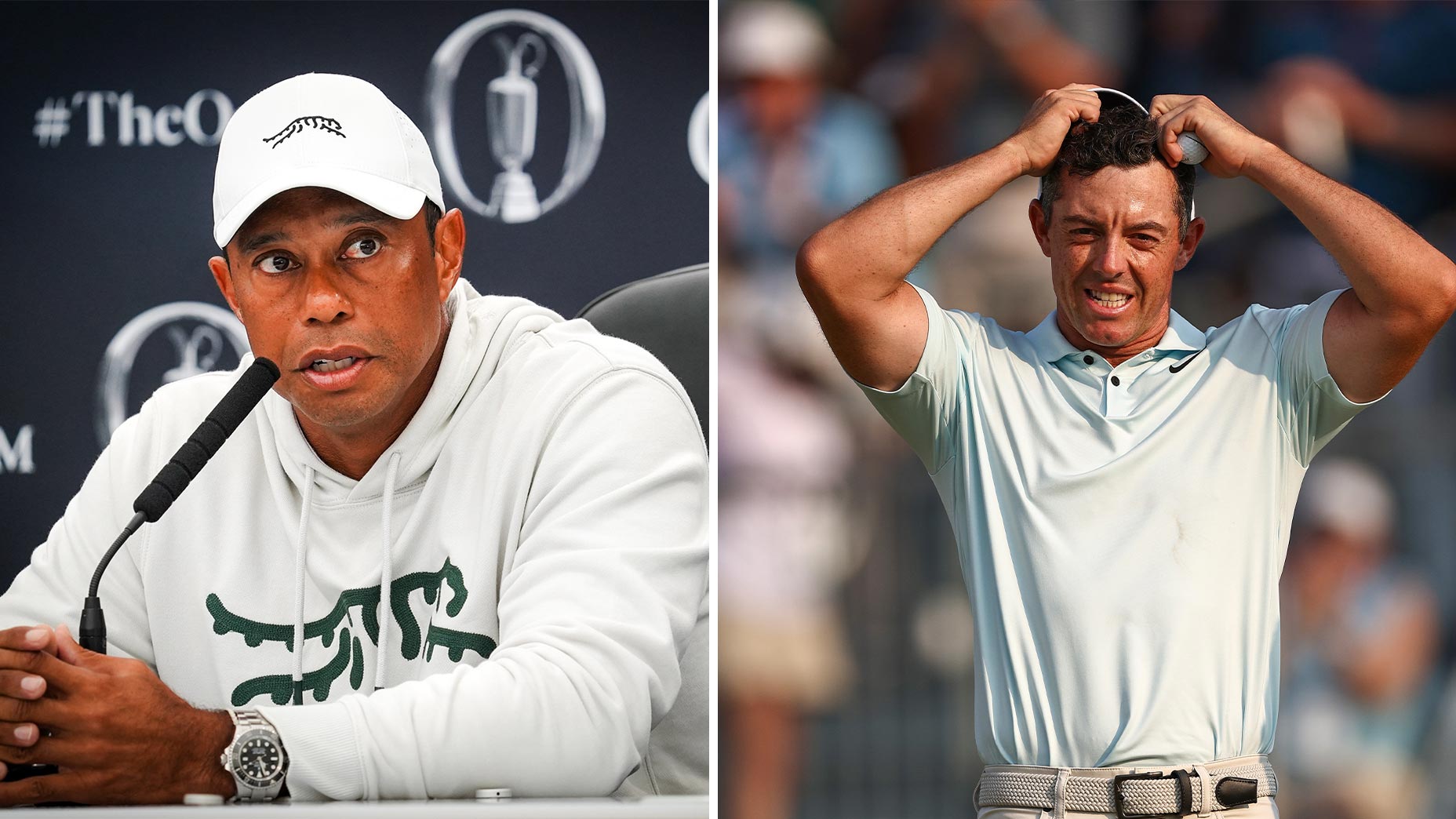Tiger Woods dishes unusually candid perspective on Rory McIlroy collapse
tiger woods speaks at podium separated from rory mcilroy u.s. open grimace
Tiger Woods addressed Rory McIlroy’s U.S. Open collapse for the first time at the Open.
Getty Images
TROON, Scotland — Tiger Woods isn’t like the rest of us.

Most of us cannot fathom what it takes to win once on the PGA Tour, and none of us can fathom the multitudes more needed to multiply that number by eighty-two, including 15 major championship titles. We cannot imagine the skill it takes to reach these achievements, nor the mental fortitude required to do so as reliably and consistently.
For these reasons, and the moments of greatness they have birthed, we have been conditioned to believe that Tiger is just different. Ephemerally, dispositionally, perhaps even cellularly. Woods’ otherness is at the core of his legacy, and it’s why it feels so jarring when moments arrive that underscore the truth: Yes, he’s different but not that different. Moments like Tuesday morning at the Open Championship, when Woods addressed the conversation at the center of the golf world this week: Rory McIlroy’s unsightly collapse at the U.S. Open.
Though it might have been hard to see in the moments following McIlroy’s short missed putts on the 16th and 18th holes at Pinehurst No. 2, Rory’s collapse only reinforced Woods’ other status. Tiger never suffered a heartbreak so utterly human despite many more opportunities, ergo … Tiger must not be human. It is easy to offer all kinds of second-and-third-order takeaways from this same logical structure: Tiger must not feel things the same way the rest of us do, he must not experience them the same, he must not fear the same.
On Tuesday at Royal Troon, Woods had an opportunity to amplify this premise. The previous week, at the Scottish Open, McIlroy addressed the press for the first time since Pinehurst and admitted to feeling “discomfort” over his two-foot par putt on the 16th hole — the putt that lipped out (now infamously) for a tournament-deciding bogey, McIlroy’s first miss from inside of three feet in 496 tries. Now, at the Open, a reporter wondered if Woods had ever experienced the same.
The question opened a door for Woods to deliver an answer reinforcing his killer instinct, explaining his cold-bloodedness in terms that unequivocally separated him from McIlroy’s gaffe and the rest of the world’s best golfers.
Instead, Woods perked up.
“Yeah, lots of times,” he said, pausing for a beat. “There’s a lot of times I felt discomfort.”
He paused again.
“Yes, absolutely,” he said, a smile spreading across his face. “Nervous, shaky, uncomfortable, yeah, all of it.”
His grin seemed to be masking a deeper emotion. Understanding, maybe? Or was it … empathy?
“You look at the highlights, I’ve missed plenty of putts. I’ve missed plenty of shots,” he said, briefly invoking Michael Jordan’s famed quote about failure breeding success. “You see all the game-winning shots, but he’s missed a ton of game-winning shots, too. The thing is you still take the game-winning shot, and I still want the last putt.”
McIlroy had the last putt and missed. Twice. After a decade of major championship torture, it’s tempting to see that fact as evidence McIlroy has lost his killer instinct. Woods knows. He faced the same questions himself.
“Probably the hardest loss to get over was the Y.E. Yang loss because I had the lead,” he said Tuesday, referencing his defeat in the 2009 PGA Championship. “I had never lost a major championship while leading. That was the first.”
The Yang loss was different from the McIlroy loss only in that Woods’ collapse happened in the middle of Sunday’s final round, while McIlroy’s came on his final shot of the tournament. Nobody remembers Tiger’s missed six-footer for birdie on the first, his over-conservative approach on the par-5 7th or his duffed eight-footer for birdie on the 13th — nobody except for Woods and Yang.
“Took a little bit of time to get over that because I had made some pretty stupid mistakes in the middle part of the round. I made a huge rally at the end, but [it was] too late,” Woods said. “I made too many mistakes in the middle. You can’t afford to make the mistakes that I made and expect to win tournaments. I know better than that.”
He knows better than that now, with the benefit of a redemptive 15th major win in 2019. But it took Woods a decade of stewing over that nervy Sunday at Hazeltine before another chance arrived. McIlroy, who could stretch to 10 years without a major championship this weekend, is still stewing — and the questions around his major championship future are still swirling. They were this way for Woods, too. You’re always a has-been right up until the moment you’re strolling up the 18th at Augusta National on Sunday with a two-shot lead.
The difference with Woods on that Sunday in Augusta in 2019 was not that he was different from Rory McIlroy at Pinehurst in 2024 or anyone else. The difference was that in the moment it mattered most, Tiger’s ball found the bottom of the hole.
“That’s part of it,” Woods said. “That’s why you love it.”
“That’s why we practice, to build up ourselves in that one uncomfortable situation … and bury it.”





